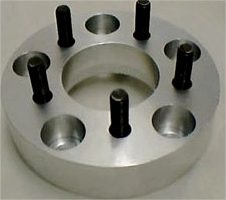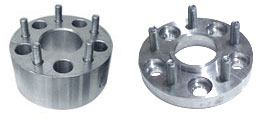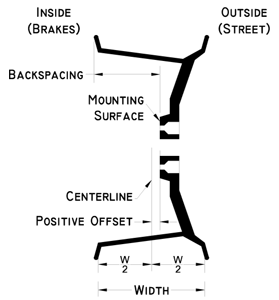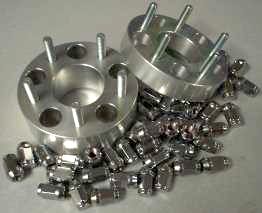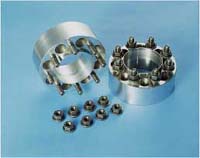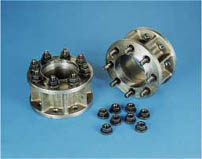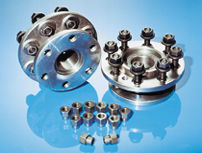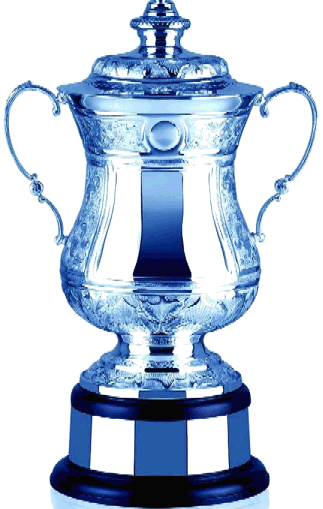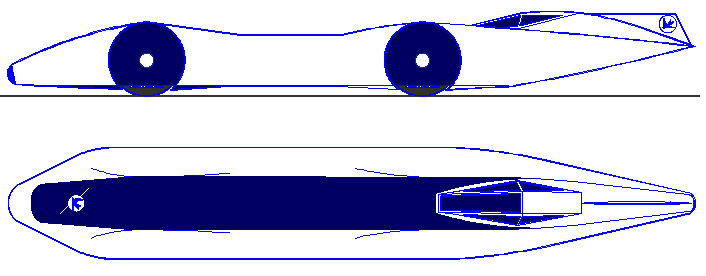|
WHEEL ADAPTERS CUSTOM PARTS
|
|
|||||||||||||||||
|
Customize your vehicle simply with wheel adapters
A wheel adapter changes the bolt pattern of your vehicle's hub and moves the wheel out allowing you to use custom wheels for most cars and vans. Some examples are shown below. We cannot manufacture at the moment but there are many companies worldwide that make a variety of popular patterns.
Typical wheel adapter - 5 stud to 5 stud pattern
These billet wheel adapters let you bolt on rims with different offsets, such as Corvette or 93+ F-body rims. These adapters bolt onto the hub, and your rim then bolts to the adapter. This method of attachment is strong as the bolt-on rim, and much stronger than the slip on spacers. If you need a spacer thicker than 1/2", then these bolt-on adapters are your only choice, other than getting different offset rims.
The adapters are fabricated from a suitable billet of 6061-T6 or similar specification aluminum. The billet is then CNC machined for precise tolerances and a perfect fit. Heavy Duty M12x1.50 studs can be pressed into the adapter for unrivalled strength. Short open ended lugnuts may be included with the adapter pair.
Custom Adapters and Applications
Wheel adapters
Offset ('82-92 Camaro example.)
Backspacing
It can also be calculated, as shown below. Don't forget to add for the rim's lip and tire bulging past the rim (use about .25"). 16x8" 0mm offset front rims would have 4.25" of backspacing. The positive 16mm rear rims (16mm/25.4 = 0.63") have about 4.9" of backspacing
Measuring Maximum Backspacing
Measuring Bolt Circles
Adapters
9.5"
/ 2 + 50mm / 25.4 Offset + 0.25" Lip = 6.97" Backspacing
Ideally, you would want some clearance on the inside of the rim to compensate for suspension movement, etc. In this case, we recommend 2" adapters for the front and rear. You can run the 2" adapters in the rear, even though you only need an extra 1.12" backspacing. This will move the wheel further out in the wheelwell, matching the front, and the wider track will help cornering as well. The only time to not match the front adapters is when you have wider wheels in the back (17x11 ZR1's for example). In that case, the wheel will fit in the wheelwell if the 1.25" adapter is used, but will protrude past the fender lip if you have a wider than necessary adapter.
For all fourth-gen rims - 2" adapters front and rear should be used on a third-gen. Some folks prefer having a thinner adapter in the rear. This will fit fine, but the rim will be inside a bit compared to the front. The same thickness on the front and rear gives a more balanced look than using thinner adapters in the rear (with the same size rims f&r) For C5 and 17x11 ZR1 rims, please do the math!
Using a 4th Gen Rear
Adapter Design
Slip-on Spacers
Wheel adapters
Bolt-on Adapters
There are two ways of bolting the adapters to your hub. One uses a lugnut with a long shank and washers. The clearance needed for the holes ends up as a slight bit of slop when they are bolted on. This isn't usually noticeable when driving. The other method is to use acorned lugnuts to bolt on the adapters, just like for the rims. The lugnuts center the adapter when they are tightened. This is a significantly more precise way to bolt on the adapters, and is how we make them.
WHEEL ADAPTERS
Using wheel adapters also has pros and cons. Pros include easy changing between 4x98mm and 4x100mm bolt pattern wheels, no permanent changes to your car, and little downtime as only the rims/tires needs to be removed to complete the conversion. Cons include increased unsprung weight and the use wheels with a large amount of offset (30-40mm). Because this conversion is "bolt on", it could be moved from one car to another with little effort, increasing it's utility for multi-FIAT owners.
The adapters should be fabricated from an appropriate grade of plate steel. Thickness will depend on your application, but use at least 1/2 inch for strength and reliability. Your machinist can help you with this selection. Both surfaces should be machined to assure flatness and parallelism. The outer diameter needs only to be large enough to accommodate the wheel studs. Make sure, however, that it is not less than the diameter of the stock wheel spacer. The inner diameter needs to be large enough to fit over the hub/axle of your desired model(s). Check the hub/axle diameter close to the brake rotor/drum as it is largest there. Next, eight holes must be machined: four for the knurled wheel studs at 4x100mm and four for the original tapered wheel bolts at 4x98mm. The holes for the knurled wheel studs should be machined as described above, but make certain that the head is completely recessed below the surface of the adapter (by counterboring) so that a flat contact can be made with the hub/axle.
The tapered bolt holes should be 1/2 inch drilled and 60 degree countersunk 1/4 inch deep. This will insure exact centering of the adapters, and therefore the new wheels. The countersink side MUST BE OPPOSITE the counterbore side, so that the wheel studs protrude away from the hub/axle. Obviously, the holes will alternate every 45 degrees, creating the pattern of eight holes. After the wheel studs are pressed into place, the adapters can be bolted onto the hubs/axles just as the original wheels are. The small bolts securing the brake rotors/drums will have to be removed to allow flat contact with the hub/axle. Because the original wheel bolt heads remain exposed, the new wheels must have clearance cavities between bolt holes. Many wheels have these voids to save material during the manufacturing process. Selection of wheel studs and nuts is the same as above. Don't forget that large offset wheels are required for use with this conversion method.
TRUCK ADAPTERS
Wheel Adapters/Spacers - Youtube videos
Please click on the links above to find out about these famous automotive makers. If your company is not included and you would like to be listed, please let us know.
UK VEHICLE INSURANCE ONLINE A - Z
No matter what car, van or bike you drive, we're all looking for great value and quality in our UK motor insurance? But who is the best - who is the cheapest and who offers the great service in the event of a claim?
See the insurance companies below who claim to offer competitive cover at sensible prices, our guide to the jargon and tips for cutting your quote - Good Luck:-
Potentially, the world's fastest electric car using energy from nature. The BE3 was inspired by the designs of Reid Railton and Ken Norris, and the exploits of Sir Malcolm and Donald Campbell between 1930 - 1964. The BluePlanet features built in battery cartridge exchange, charged using renewable solar energy. Sponsors sought for the 2016 season. The blue bird legend continues.
|
||||||||||||||||||
|
This
website is copyright © 1991- 2014 Max Energy
Ltd. All rights
reserved. The bird logo
|
||||||||||||||||||
